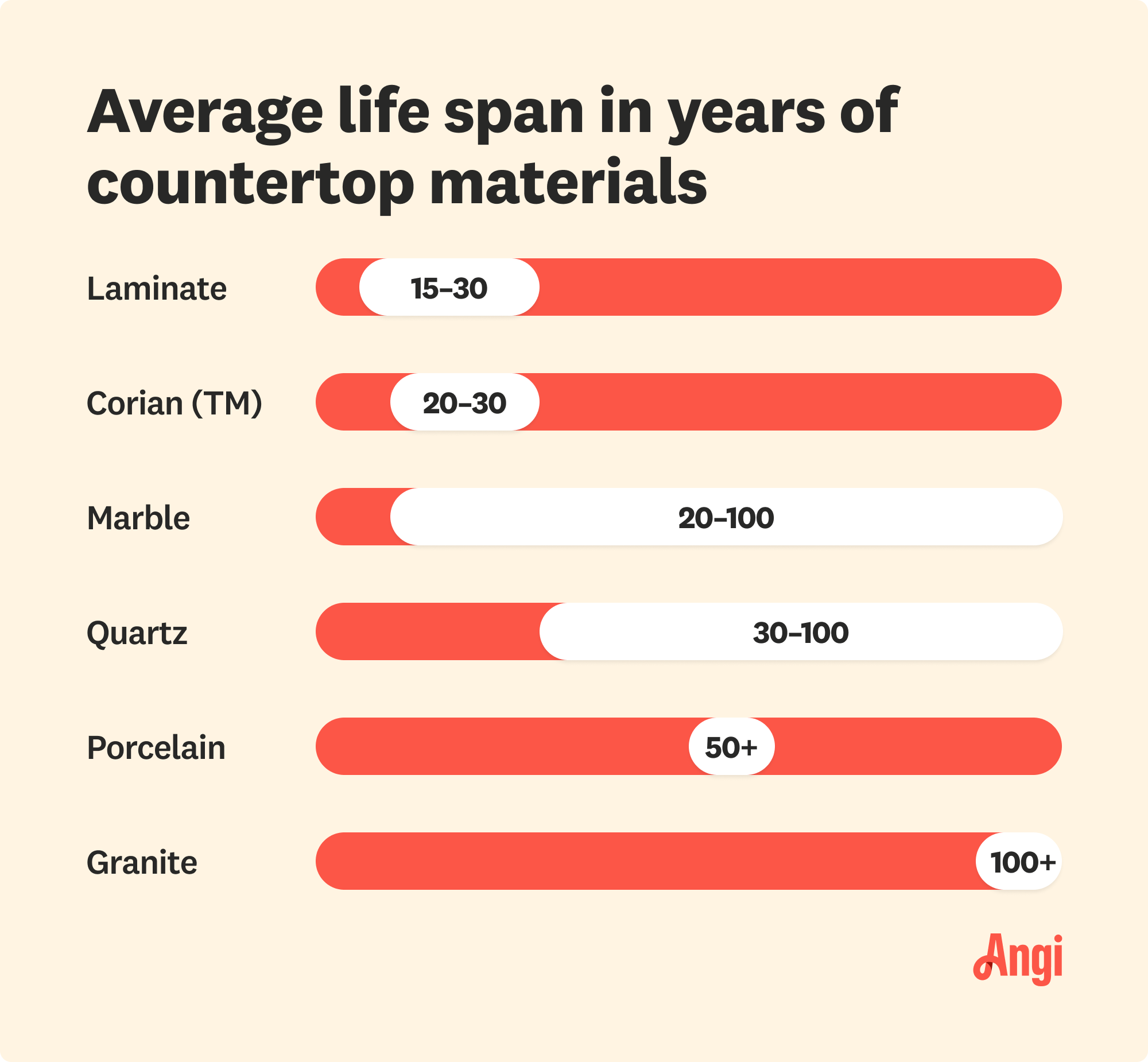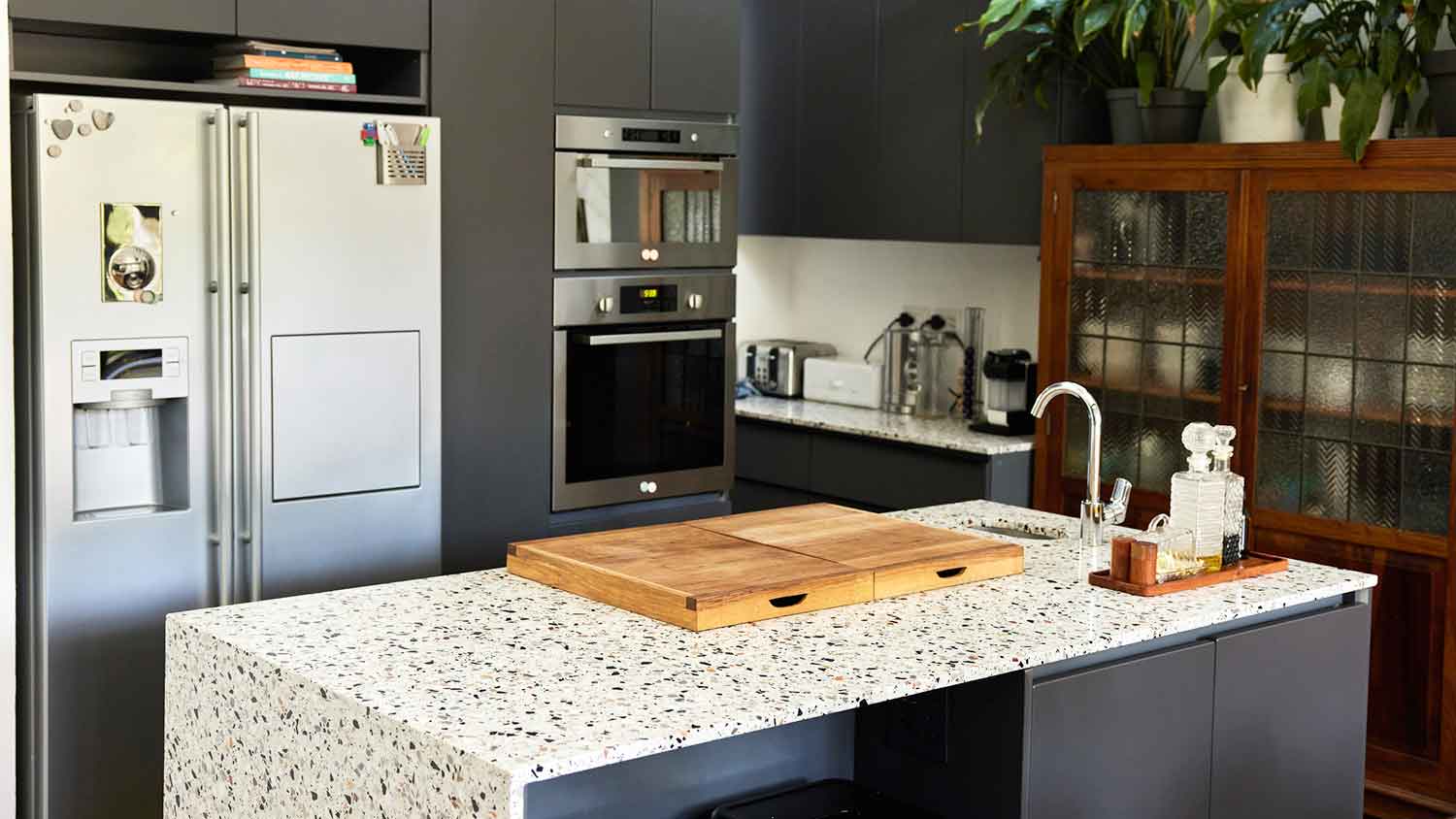
Ready for a new laminate counter? Find everyone you need to know about the cost of laminate counters and what affects your bottom line.
Let’s do some thinking


Refinishing gives your countertops a new look and is a cost-effective option when appropriate.
Replacing your countertops costs more but might be necessary if they have extensive damage.
Refinishing can extend your countertops’ lifespan by up to 10 years.
Unsightly countertops getting you down? We’re here with a guide to help you decide whether to refinish or replace countertops. After years of use, countertops can become dull, stained, scratched, or even cracked. And given the wide range of countertop materials—laminate, butcher block, and granite, to name a few—the final decision will come down to material, age, and condition.
Consider these factors when deciding to refinish versus replace your countertops.
Countertop material: Butcher block countertops that are scratched, dented, and worn can be sanded until they’re smooth again and then sealed with mineral oil. Laminate countertops can be replaced, painted, or refinished. Granite and other natural stone countertops can be buffed if they’ve turned dull, and more minor chips or cracks can be filled with epoxy, but if there’s a large crack, the whole slab may need to be replaced.
The issue: You may be able to repair scratches in a granite countertop or fix burnt laminate countertops, but deciding to repair or replace countertops comes down to the cost and labor involved for each route.
Countertop condition: If the countertop is in poor condition or very old, and countertop resurfacing isn’t an option, it may be time to replace it. Refinishing the countertop may be the best option if it is in relatively good condition.
| Refinish | Replace |
|---|---|
| Countertops with minor damage, like scratches, cracks, and stains | Countertops with significant or widespread damage |
| Countertops that are less than 10 years old | Countertops approaching their expected lifespan or in an outdated style |
| Easy-to-refinish materials | Hard-to-refinish materials |

The lifespan of countertops depends on their material and how well they’re cared for.
Granite countertops can last a lifetime (100 or more years) if regularly sealed to protect them from moisture damage.
Quartz countertops can last 100 years if protected from heat and UV damage.
Marble countertops can last 30 or more years with proper care and maintenance.
Limestone, soapstone, and sandstone countertops last between 20 and 50 years.
Concrete countertops usually last around 20 years, at which point they may start to crumble or be more easily scratched.
Laminate countertops last 15 to 30 years and may start to look old and dingy before that.
Wood countertops last 10 to 30 years for softwoods and 100 years or more for hardwoods.
Tile countertops can last over 100 years if kept clean and damage is addressed quickly.
Corian countertops can last 20 to 30 years if protected from scratches, stains, and heat damage.
You can prolong the life of your countertops by cleaning and maintaining them as directed by the manufacturer, and refinishing countertops can often prolong their life beyond their expected lifespan.
Ultimately, the decision between refinishing and replacing your countertops may come down to your budget. Refinishing countertops costs between $200 and $600, depending on the countertop material and the extent of the damage. Installing new countertops costs $1,850 to $4,450, depending on the material you choose and the size of your kitchen. Marble and granite are usually the most expensive options, topping out at $140 and $190 per square foot, respectively.
Refinishing countertops is a cost-effective option to give your kitchen a fresh look, but not all countertops can be refinished.
Refinishing your countertops is a low-cost option to give the surface new life. Here are some indications that refinishing is an option for your countertops.
If you installed the countertops within the last decade, they are new enough that it makes more sense to refinish and prolong their life than replace them. Check the average lifespan of your countertop material and use that information to inform your decision. For example, laminate countertops can last 15 to 30 years, so if yours are only 5 or 10 years old, refinishing them can give them extra life.
The condition of your countertops will also determine whether it makes sense to refinish them. Countertops with minor scratching and a few dings are prime candidates for refinishing. Filling in a few gouges and applying a new coating can instantly give your kitchen a new look and feel.
Some countertop materials are more straightforward to refinish than others. For example, laminate countertops are easy to refinish; you only need some laminate repair paste to fill in minor scratches and paint or peel-and-stick vinyl sheets to give your countertops a makeover. Stone countertops like granite and marble can be repaired and resealed by a DIYer or a pro to freshen them up.
Refinishing countertops is a DIY-friendly project for many homeowners. You can refinish your countertops within a weekend if you have the right equipment and supplies. The process involves cleaning the surface, repairing any damage, and applying a coating to give it a new finish.
However, you may prefer to hire a pro for this project if you’re not confident in your DIY skills or don’t have the time to do it yourself.
Refinishing countertops isn’t always possible. Here are some scenarios where replacement may be the best choice for your kitchen.
Replacing countertops you installed several decades ago is often the better choice. Old countertops may be nearing the end of their expected lifespan and may also look and feel outdated.
Easy repairs and countertop refinishing can fix minor damage, but more extensive damage may not be repairable. For example, a large crack in a granite or marble countertop cannot be re-bonded, and you’ll need to replace the slab instead.
Some countertop materials are more complex than others. For example, quartz countertops can’t be refinished using traditional methods because of their hardness. A professional may be able to refinish quartz, but if the material is damaged enough, it might cost less to replace the quartz with a new, cheaper countertop material.
Some countertop materials are more DIY-friendly than others. For example, a relatively inexperienced homeowner can replace a laminate or tile countertop with some helping hands and hard work.
Other materials, like natural or engineered stone, usually require installation by a local countertop contractor. Granite, marble, quartzite, and quartz are all extremely heavy and bulky, and installing this type of countertop without experience can damage the countertop and even cause injury to you and your helpers.
From average costs to expert advice, get all the answers you need to get your job done.

Ready for a new laminate counter? Find everyone you need to know about the cost of laminate counters and what affects your bottom line.

Are you leaning towards solid surface countertops? If so, you've likely come across Corian®. Find out how much Corian® countertops cost so you can plan your project.

Looking to upgrade your kitchen with a stand-out hardwood feature? This guide will help you determine your butcher block countertop costs.

Looking for a unique countertop material that’s low maintenance, durable, and cost-effective? Check out the pros and cons of porcelain countertops.

Recycled glass countertops are made from discarded glass and a durable binding agent. Learn whether recycled glass countertops are the best choice for you.

When you need someone who can install butcherblock countertops, your best bet is to hire a countertop contractor or finish carpenter.